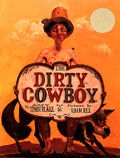Purple Crayon home page | More useful articles | Search for more information | Purple Crayon Bookstores
Help! The Writing
Process of The Dirty Cowboy:
From Family Story to Published Book
by Amy Timberlake
Introduction
|
The Dirty Cowboy (Amazon page) This article and others are hosted by: Find more resources for writers in the Articles section. * * *
Other places to shop: |
Don't get me wrong. I still fantasize about a 72-hour sleepless struggle with story and then banging triumphantly out of my office with pages of perfect prose clasped in my fingers. Hey, maybe some day it'll happen. But I am beginning to think that writing is a more communal art than any of us want to admit. In fact, I'm starting to believe that telling a good story often takes a lot of people who hear the story, or read the story and then hold out suggestions like lumps of apple. As the authors of our stories, we choose whether or not to taste those suggestions, hoping that we have enough wisdom to turn from the ones that show signs of being mealy, or worse, housing worms.
I started thinking about my embarrassment (shame really) about those good ideas offered by others when a writer friend read her short story to a few of us. Her story had been published in a literary journal as prestigious as The New Yorker, and after her reading, in a gush of confession, she said that one of her teachers suggested a moment near the pinnacle of the story. It was a great moment and it heightened the drama. The writer kept her eyes down and then glanced at us sheepishly. It was almost as if she expected us to turn ashen, see her as a cheat and a hack, and stalk out of the room with this condemnation reflected in our eyes: You didn't deserve to be published, and certainly didn't deserve the acclaim of this particular publication!
Of course none of us walked out. Still, I was struck by her admission. I remember thinking that though the suggestion was a golden one, it was the author who recognized its value and had the craft to wield it. She was the one who fit the suggestion into the dramatic tension of her story. She was the one who shaped the language so we gasped, surprised, discovering the scene.
But I understood how she felt, because I've had much more help with my picture book text, The Dirty Cowboy (a mere 1500 words) than I ever imagined possible.
So in the hopes that we'll all talk about this more (with a little less shame and with a little more excitement about the process of unearthing our story), and because I was raised Lutheran and somewhere deep must believe that truth-telling is good for the soul – well, you might say I want to confess. I'll go first.
Continue to: Part One: Help from Family, Critique Groups and SCBWI
Copyright © 2005 by Amy Timberlake.
Home page | Articles index
